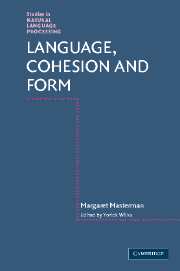Book contents
- Frontmatter
- Contents
- Preface
- Editor's introduction
- Part 1 Basic forms for language structure
- Part 2 The thesaurus as a tool for machine translation
- Part 3 Experiments in machine translation
- Part 4 Phrasings, breath groups and text processing
- Part 5 Metaphor, analogy and the philosophy of science
- Bibliography of the scientific works of Margaret Masterman
- Other References
- Index
Editor's introduction
Published online by Cambridge University Press: 22 September 2009
- Frontmatter
- Contents
- Preface
- Editor's introduction
- Part 1 Basic forms for language structure
- Part 2 The thesaurus as a tool for machine translation
- Part 3 Experiments in machine translation
- Part 4 Phrasings, breath groups and text processing
- Part 5 Metaphor, analogy and the philosophy of science
- Bibliography of the scientific works of Margaret Masterman
- Other References
- Index
Summary
A personal memoir: Margaret Masterman (1910–1986)
Margaret Masterman was ahead of her time by some twenty years: many of her beliefs and proposals for language processing by computer have now become part of the common stock of ideas in the artificial intelligence (AI) and machine translation (MT) fields. She was never able to lay adequate claim to them because they were unacceptable when she published them, and so when they were written up later by her students or independently ‘discovered’ by others, there was no trace back to her, especially in these fields where little or nothing over ten years old is ever reread. Part of the problem, though, lay in herself: she wrote too well, which is always suspicious in technological areas. Again, she was a pupil of Wittgenstein, and a proper, if eccentric, part of the whole Cambridge analytical movement in philosophy, which meant that it was always easier and more elegant to dissect someone else's ideas than to set out one's own in a clear way. She therefore found her own critical articles being reprinted (e.g. chapter 11, below) but not the work she really cared about: her theories of language structure and processing.
The core of her beliefs about language processing was that it must reflect the coherence of language, its redundancy as a signal.
Information
- Type
- Chapter
- Information
- Language, Cohesion and Form , pp. 1 - 18Publisher: Cambridge University PressPrint publication year: 2005
